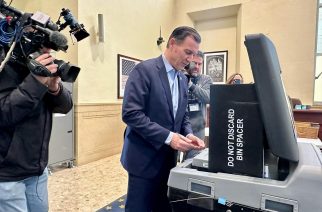
From left, Assemblyman Joseph Morelle, Senator Joseph Griffo, former UFC middleweight champ Chris Weidman and UFC Chief Operating Officer Lawrence Epstein during a press conference earlier this year calling for New York state to legalize professional MMA.
Supporters of the bill sanctioning mixed martial arts in New York state are hopeful Gov. Andrew Cuomo will soon sign the measure into law after it finally passed in the Assembly Tuesday night.
Sen. Joseph Griffo, a long-time sponsor of the Senate bill, said the new law would ensure safer competitions, allow New York athletes to compete in their home state and provide an economic boost for communities that host fights.
While the Senate has repeatedly voted each of the last seven years to approve Griffo’s bill (S.5949-a), the Assembly has never taken up the bill in the past. On Tuesday, the Assembly bill moved quickly through the Tourism, Codes, Ways and Means and Rules committees before being put on the calendar for a floor vote.
The Assembly bill passed 113-25.
“It took us seven years, but now New York state can finally make these competitive fighters proud by showing that we never gave up until they were allowed to compete in their own home state,” said Senator Griffo, R-Rome. “I am proud to have led the charge in the Senate from the start to lift the statewide ban on professional mixed martial arts, and I thank the Assembly for finally joining us in this fight.”
This legislation now must be approved by the governor, who has already expressed his support for legalizing MMA in his proposed budget earlier this year. By allowing professional MMA competitions in the state, a 2013 economic impact study estimated that these events could provide an economic boost of $135 million each year: $68 million annually from these events, including $33 million generated in upstate cities alone, along with MMA training centers that could generate an added $67 million each year from their operations.
Griffo and other lawmakers have noted that this legislation would ensure greater safety measures for combative fighters in New York by providing the same oversight as other professional sports through the New York State Athletic Commission. Amateur fights have taken place in New York, but they have been unregulated and unsanctioned by the state.
The bill also includes a number of provisions regarding the health, safety and financial welfare of the participants in combative sports, as well as their spectators.
“As this competitive fighting continues to grow in popularity all across North America, it made absolutely no sense to maintain New York’s status as the only state that bans professional MMA,” Griffo added. “Fans could watch it anytime on TV or attend the events in other states, and our own up-and-coming fighters would be limited to amateur competitions in New York that did not always guarantee the safest conditions for athletes and spectators. These athletes and their fans deserve better in New York, and I’m glad we can finally give them that opportunity.”
The Assembly bill (A.2604) was sponsored by Assemblyman Joseph Morelle, D-Irondequoit.
“This long-standing ban served no purpose but to put New York at a disadvantage on every level in the MMA arena – athletes were deprived of the honor and safety they deserved, fans were deprived of the enjoyment they demanded and communities were deprived of the economic benefit that would come from hosting these events,” Griffo said. “I commend Assemblyman Morelle for recognizing how important this opportunity is to our state and its dedicated fighters, and I thank him for his support in leading this bill through the legislative process.”
Cuomo has signaled support for the bill legalizing mixed martial arts in New York and included projected revenue from MMA events in the upcoming budget for the 2016-2017 fiscal year.
A long floor debate in the Assembly Tuesday afternoon shows why some lawmakers are uneasy about legalizing this type of fighting.
Assemblywoman Deborah Glick, D-Greenwich Village, said allowing mixed martial arts in New York state sends a message to young people that there is a career path for them in an activity that could seriously jeopardize their future health.
“While it may take some time to develop, one can only hope that state taxpayers and these young people will not be the ones paying the price for the profits of these promoters and sports venues,” Glick said.
Glick cited a study in the March 21, 2014, issue of the American Journal of Sports Medicine that shows about one-third of professional MMA matches end in a knockout or a technical knockout. A technical knockout occurs when a fight is stopped by a referee who determines that a fighter is no longer able to defend him- or herself. She said this study indicates that there is a higher incidence of brain trauma in MMA than in boxing or other martial arts.
“It is my belief that many of these states allowed this so called sport long before we learned of the long term physical impacts of combative sports. As we’ve seen from recent reports focused on the damage to National Football League players, their injuries are wide ranging and include declining cognitive ability,” Glick said.
The Ultimate Fighting Championship, the largest and most well-known promoter of mixed martial arts fights, has been lobbying to get this bill passed for several years. Immediately after the Assembly passed the bill Tuesday night, UFC Chairman and Chief Executive Officer Lorenzo Fertitta said the league has committed to holding at least four events per year in New York for the next three years in cities such as Buffalo, Rochester, Syracuse, Utica, Albany and New York City.
“New York’s amazing arenas — upstate and downstate — have worked with us to advocate passage of this bill. So, too, have restaurants, hotels, businesses and others who recognize the economic value professional MMA can bring to New York,” Fertitta said.
Fertitta points out that more than 20 UFC athletes have been to Albany to lobby for legalizing the sport in recent years. Fans also have been vocal about their desire to see New York sanction the sport. “It took a while, but their voices have been heard,” he said.









